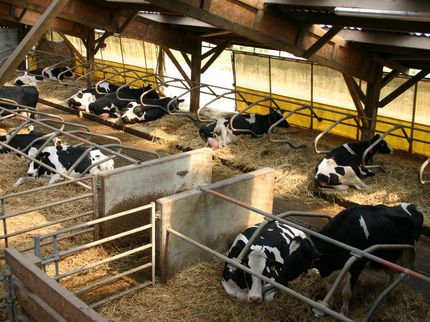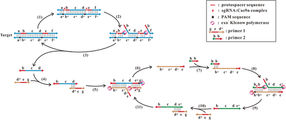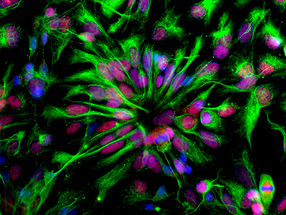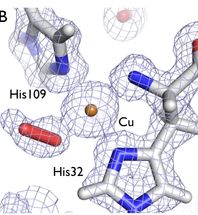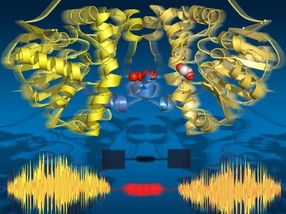Adequate intake of milk and dairy products in different life stages helps prevent chronic diseases
Ángel Gil, Professor of Biochemistry and Molecular Biology at the University of Granada, has recently coordinated a study reviewing worldwide scientific literature on the role of dairy products in health and in the prevention of chronic diseases (cardiovascular, metabolic syndrome, colon or bladder cancer, and type 2 diabetes). The review also covers the effects of dairy products on growth, bone mineral density, generation of muscle mass, and during pregnancy or breastfeeding.

symbol image
Photo by Nikolai Chernichenko on Unsplash
An adequate consumption of milk and dairy products at different life stages can help prevent various chronic diseases. For example, there is a positive link between the moderate intake of milk during pregnancy and birth weight, length, and bone mineral content during childhood. In addition, a daily intake of milk and dairy products among elderly people may reduce the risk of frailty and sarcopenia. These are just some of the conclusions of a systematic review of 14 articles dealing with the role of milk and dairy products in the prevention of chronic diseases. The findings of the review were recently published in Advances in Nutrition, the third most important scientific journal in the world in the field of nutrition and dietetics.
The review was conducted by scientists from different Spanish, European, and American universities, and coordinated by Professor Angel Gil of the University of Granada (UGR) and Professor Rosa M. Ortega of the Complutense University of Madrid. The work was funded via the European Union project H-2020 No. 734451 and supported thanks to the collaboration of Spain’s Interprofessional Dairy Organisation (INLAC).
The study reviews worldwide scientific literature on the role of dairy products in health and in the prevention of chronic diseases (cardiovascular, metabolic syndrome, colon or bladder cancer, and type 2 diabetes). It also examines the effects of dairy products on growth, bone mineral density, generation of muscle mass, and during pregnancy or breastfeeding.
Milk and dairy products contain multiple nutrients and contribute to meeting the nutritional requirement for protein, calcium, magnesium, phosphorus, potassium, zinc, selenium, vitamin A, riboflavin, vitamin B12, and pantothenic acid. Yet the consumption of dairy products is on the decline, falling short of the level recommended in many countries, as the potential benefits of milk and dairy products are starting to be questioned.
This review, coordinated by the UGR, aims to evaluate and synthesise the scientific evidence on the effect of milk and dairy product consumption in terms of health and
prevention of various chronic diseases and all-cause mortality, bearing in mind the importance of maintaining an adequate quality of diet in the different stages of the life cycle. The evidence gathered in the study is based on the findings of meta-analyses and systematic reviews of observational studies, randomized controlled trials, and reviews.
Dairy products and chronic diseases
This review synthesises the current scientific evidence pertaining to various topics of great interest to the scientific community. All refer to articles dealing with systematic review and/or meta-analysis, based on different types of study design. The topics studied in depth include:
-
Effect of milk and dairy product consumption during pregnancy and breastfeeding.
Effect of dairy product consumption on the height and bone mineral density of children.
Consumption of milk and dairy products and risk of mortality.
Effect of milk and dairy product consumption on the risk of frailty and sarcopenia, and cognitive performance in older people.
Effect of milk and dairy product consumption in the prevention of osteoporosis and osteoporotic fractures.
Consumption of dairy products in the prevention of metabolic syndrome.
Effect of milk and dairy product consumption on type 2 diabetes.
Effect of milk and dairy product consumption on cardiovascular diseases.
Association between dairy product consumption and the risk of colorectal cancer in adults.
Consumption of milk and dairy products and the risk of prostate cancer and mortality.
Consumption of milk and dairy products and the risk of bladder cancer.
Consumption of milk and dairy products and inflammatory biomarkers.
The role of fortified dairy products in cardio-metabolic health.
The researchers also found that a higher intake of dairy products presents no clear association with a decrease in total osteoporotic fracture or hip fracture risk, but there is an association with decreased vertebral fracture risk.
In the analysis of the differences between high vs. low consumption of dairy products, no association was identified between dairy product consumption and increased risk of mortality. The total intake of low-fat dairy products was associated with a reduced risk of metabolic syndrome, supporting the view that the consumption of dairy products does not increase the risk of cardiovascular disease and could have a slightly protective effect.
Inverse associations were observed between dairy product consumption and ischemic heart disease and myocardial infarction. Current scientific evidence also suggests that
the consumption of such products, especially low-fat dairy and yoghurt, may be associated with a lower risk of type 2 diabetes.
It has also been shown that moderate consumption of this food group is associated with a lower risk of colorectal cancer and bladder cancer, while no associations were found for prostate cancer. Nor has the intake of milk or dairy products been shown to demonstrate a proinflammatory effect on overweight or obese individuals, or on those presenting other metabolic abnormalities.
Fortification of dairy products with phytosterols and omega-3 fatty acids appears to constitute a suitable strategy for improving cardiometabolic risk biomarkers.

